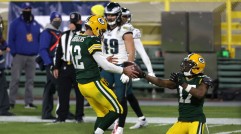Youth Movie Review: Paolo Sorrentino's Latest Film Is Meditative, Thought-Provoking & Uplifting
What happens to people when they retire? Where do they go? What is left for them in life? How do they finish out their days?
In the world of Paolo Sorrentino's "Youth," this group of people spends time in a retreat center in Switzerland with their own purposes in mind. Yet the answers to the aforementioned questions are never quite that simple.
For one the definition of retirement is rather dubious indeed. Some characters, such as Fred (Michael Caine), is truly retired from his profession. Yet his best friend Mick Boyle (Harvey Keitel), a filmmaker, is unwilling to accept this state. But things seems to get a bit more tricky when you factor in that the world of this resort, also features a plethora of youthful subjects including Fred's daughter Lena (Rachel Weisz), whose marriage has just gone down the tubes, and an actor trying to get his career back (Paul Dano). So on some level, one might be more privy to reinterpret this place as the one where the rejected wander while they figure out their next step.
It is an interesting setup for a film that meanders throughout, constantly having its characters reflect on where they are headed. As noted, some have hope, best embodied by a Buddhist with aspirations of levitating despite the non-believers. Others, like Fred, have given up.
At the center of the film is the dichotomy between Fred and Mick. As the movie opens, Fred is being offered an opportunity to perform for the Queen of England to become knighted. Yet the composer-conductor staunchly refuses his call to action, failing to recognize that people still want him in their lives. In essence his "retirement" is unlike many others in the film, it is self-imposed.
Meanwhile Mick is hard at work on trying to unravel the script for his latest film, seemingly ignoring the fact that his time has come and gone and no one wants him. He is constantly huddled around with a group of fellow screenwriters as they try and figure out an ending to a movie that seemingly never comes to them; it is a tragic bit of irony that the ending comes in both an expected and unexpected manner.
While Fred slowly but surely discovers how he can still be useful and seek out redemption for his past trauma, Mick's trajectory is another one altogether, making this film both despairing and rejoicing as it draws to its cathartic end. Audiences will no doubt be spellbound by one sequence in which Mick looks out onto a hill and see his past creations, so near and yet so far from him at this point in his life. It is cinematic genius at its most subtle and emotional.
The layering of the story with other colorful characters adds to the nuance and depth on display. Dano's Jimmy Tree is a person haunted by the one role that has defined his career. Trying to move away from embracing that situation, he finds himself in even greater despair. The character he winds up transforming himself into to get away from that identity expresses just how low he has gone. When the redemption does come, he, like Fred, realizes that he can have an impact on people despite his reluctance to accept his fate.
Lena's journal is the most straightforward, yet her relationship with an eccentric character expresses the notion that solutions to problems can be found in places we least expect.
The film is laden with nostalgia; from its overt visual references to Fellini to its use of operatic singing as narrative framing devices (an older piece by Mercadante is used in the credits while a modern composition, equally lyrical, is showcased at the film's climax) to the baroque architecture that dominates the film. There is even a character that looks like an older and more obese Diego Maradona (there is even a memory of him in his Argentina jersey at one point) that adds levity to the proceedings. But how beautiful it is, especially when paired with Sorrentino's meditative style that sometimes borders on stream of consciousness. Often times music will come into play for the briefest of seconds, taking the viewer into a different world for the shortest of moments. At others, imagery will move the audience away from a scene, only to bring them back to it moments later. What is most surprising perhaps is how well-paced "Youth" is. For all of its rhapsodic feeling, the film moves in a linear direction with few divergences.
The performances are top notch of course with Caine leading the pack as the stern and of-putting Fred. Yet as the film progresses, his vulnerability slowly comes to the fore. Smiles become more apparent, but what audiences will undeniably remember is a scene in which Fred admires a young boy that he has just impacted; it is an unexpected moment in the narrative, a small one even, but for Fred it proves to be a major turning point for his development. Another scene in which he reveals his inner turmoil is equally powerful, his fury jolting the viewer back in heart-breaking fashion.
Keitel's Mick is far more friendly and charismatic, his face glowing throughout the early proceedings. But then wait for his big scene with Jane Fonda and watch where the character goes from there. It is a complete reversal and a painful one to endure.
Weisz is extraordinary as usual; her shrieks of pain at one point will rile up your intestines. Dano by contrast will come off as arrogant and marginally intolerable early on, but win over the viewer with his deep sense of loss and grief as the story unravels.
"Youth" is a movie where every character is complex and rich. A film in which every image has the viewer in rapture. A film in which we can connect with every moment, not only as we look out toward what our future holds, but also in how even our smallest actions in the present can change our outlook on life.
Subscribe to Latin Post!
Sign up for our free newsletter for the Latest coverage!














